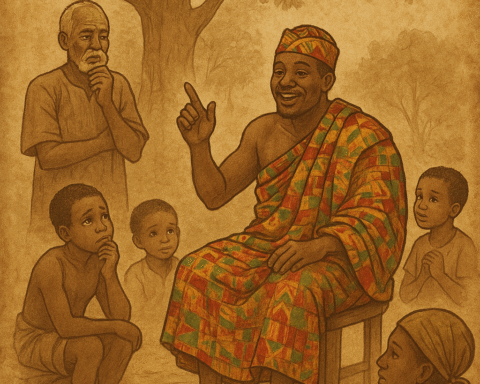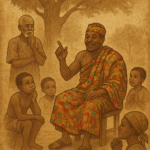In the heart of Cameroon’s ancient forests, where the mist clings to towering trees and the earth holds secrets older than memory, there once stood a village filled with strong, restless men. These were not ordinary villagers content with tending crops and raising families. No, these men possessed hearts that burned with curiosity and souls that yearned for adventure beyond the familiar paths of their homeland.
Day after day, as they sat around the evening fires, their conversations would inevitably turn to the mysterious force known as Death. The old storytellers spoke of this being in hushed tones the one whose shadow touched every living creature, the inevitable visitor who came uninvited to every home. Yet because none of these bold men had ever gazed upon Death’s face, their fear slowly transformed into arrogance.
“Why should we tremble at the mention of Death’s name?” declared the strongest among them, his chest puffed with pride as the firelight danced across his determined features. His companions nodded eagerly, their eyes gleaming with the dangerous spark of unchallenged confidence.
Also read: Cheche the Baby-Minder
“Let us seek him out ourselves,” another proclaimed, rising to his feet with theatrical bravado. “We will stare Death in the eye and show him that we are not like other men. Perhaps we can strike a bargain agree to serve him in exchange for eternal life. Or better yet, perhaps we can defeat him in combat and free ourselves forever from his dominion.”
Their words grew bolder with each passing night, their boasts more elaborate and reckless. They spoke of Death as if he were merely another enemy to be conquered, another obstacle to be overcome through strength and cunning.
The village elders, their faces weathered by decades of wisdom and sorrow, watched these young men with growing concern. Their aged eyes had witnessed too much of life’s harsh realities to be fooled by such dangerous pride.
“My sons,” the eldest among them pleaded, his voice carrying the weight of countless seasons, “no one seeks Death and returns unchanged. The spirits of our ancestors whisper warnings live your lives with wisdom and gratitude. Do not disturb the unseen powers that govern our world.”
But their words fell upon deaf ears. The men’s hearts had already been captured by their foolish quest, their minds poisoned by their own arrogance. They could not be swayed by wisdom or deterred by warnings.
When the first light of dawn painted the sky in shades of gold and crimson, the men gathered their provisions with ceremonious importance. They filled their gourds with fresh water from the village well, packed baskets with dried meat and cassava, and grasped their walking sticks like weapons of war. With confident strides and voices raised in boastful songs, they departed their village and ventured deep into the mysterious forest.
For seven days and seven nights, they journeyed through landscapes that grew stranger and more foreboding with each step. They called out to the ancient baobab trees, whose massive trunks had stood since the world was young. They questioned the serpentine rivers that wound through the darkness like liquid silver. They pleaded with the colorful birds whose songs carried messages between the worlds of the living and the dead.
“Where can we find the dwelling place of Death?” they asked every creature they encountered.
The forest seemed to hold its breath, offering no answers to their reckless questions.
On the eighth day, as exhaustion began to weaken their resolve and doubt crept into their hearts, they discovered a solitary figure sitting motionless beside the forest path. It was an ancient man, so old that his skin appeared translucent as dried leaves, his frame bent and fragile as a bird’s nest weathered by countless storms. His eyes were deep hollow caverns that seemed to hold the memories of every soul that had ever lived and died.
When he spoke, his voice rustled like wind through autumn grass, dry and distant as an echo from another world.
“What do you seek, travelers?” the old man inquired, though his tone suggested he already knew their answer.
The men, despite feeling an inexplicable chill run down their spines, replied with forced boldness, “We are searching for Death. We wish to meet him face to face.”
The ancient figure’s lips curved into a smile that contained no warmth, no joy only the terrible knowledge of inevitable truth.
“You have found him,” he whispered.
In that moment, the very air around them seemed to thicken and grow heavy with dread. The forest fell into a silence so complete that even their own heartbeats sounded like thunder in their ears. The old man began to rise, and as he did, his true nature revealed itself in ways that transcended physical form. This was Death himself not the fierce warrior they had imagined, not the negotiable spirit they had hoped to encounter, but the fundamental force that dwells within every breath, every shadow, every moment that passes from present into past.
Their proud hearts, which had beaten so confidently just moments before, now hammered against their ribs like trapped birds desperate for escape. Some of the men dropped their carefully packed provisions, their hands trembling uncontrollably. Others found their legs betraying them, buckling beneath the weight of their terror.
They had expected to find Death as something external, something they could fight or flee from. Instead, they discovered that Death had been with them all along in their own mortality, in the finite nature of their existence, in the precious fragility of every moment they had taken for granted.
One by one, the men collapsed to the forest floor, overwhelmed by the magnitude of their realization. Some attempted to run, but their bodies no longer obeyed their desperate commands. Only a handful managed to stumble back through the forest, their faces pale as moonlight, their spirits forever altered by their encounter with ultimate truth.
Those who returned to their village were no longer the arrogant men who had departed. They spoke little of their journey, and never again did they boast about conquering death. Instead, they threw themselves into their work with newfound purpose, cherishing every moment with their families, treating each sunrise as a precious gift rather than an assumed right.
When curious villagers asked about Death, the survivors would only shake their heads with profound sadness and hard-earned wisdom.
“Do not seek him out,” they would whisper. “He will find each of us when our time has come. Until then, live fully, love deeply, and be grateful for every breath you are given.”
The Moral Lesson
This powerful Cameroon folktale teaches us that some forces in life are beyond human control or understanding, and that wisdom lies in accepting our limitations rather than challenging them through pride and arrogance. The story reminds us that death is not an enemy to be defeated, but an inevitable part of existence that gives meaning and urgency to life itself. By attempting to confront death directly, we risk losing sight of life’s true treasures family, community, and the simple joy of being alive. True courage comes not from seeking dangerous encounters with the unknown, but from living each day with purpose, humility, and gratitude.
Knowledge Check
Q1: Who were the main characters in this Cameroon folktale about seeking Death? A: The main characters were a group of strong, restless men from a village in Cameroon who boasted about wanting to find and confront Death, along with the village elders who tried to warn them, and ultimately Death himself, who appeared as an ancient, frail old man.
Q2: What motivated the men to seek out Death in this African folktale? A: The men were motivated by pride, curiosity, and arrogance. Since none of them had ever seen Death, they began to boast that they could defeat him or make a bargain for eternal life, refusing to fear what they hadn’t witnessed themselves.
Q3: How did Death appear to the men in this Cameroon story? A: Death appeared as a very old, thin, and bent man sitting by the roadside, with hollow eyes and a dry voice like the wind. When he revealed his true identity, the forest grew silent and heavy, and the men realized Death was not something external but an inherent part of existence.
Q4: What lesson did the surviving men learn from their encounter with Death? A: The survivors learned humility and the value of life itself. They stopped boasting, worked hard, cherished their families, and treated each day as a gift rather than something they were entitled to, understanding that death would come naturally when the time was right.
Q5: What role did the village elders play in this Cameroon folktale? A: The village elders served as the voice of wisdom and caution, warning the young men that “no one seeks Death and returns the same” and advising them to “live wisely and not disturb the unseen powers.” Their warnings were ignored, proving their wisdom correct.
Q6: What cultural values does this Death-seeking story from Cameroon represent? A: This folktale represents traditional African values of respecting elders’ wisdom, understanding one’s place in the natural order, showing humility toward forces beyond human control, and appreciating the preciousness of life and family relationships.
Source: Cameroon folktale, as retold from Shadows in the Firelight





